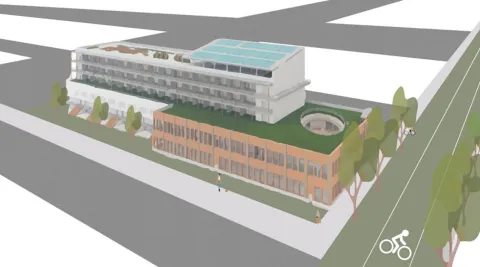UBC design team takes top spot at Solar Decathlon

Third Quadrant Design, a multidisciplinary student design team, has placed first in its division at the US Department of Energy's Solar Decathlon Design Challenge for the second year in a row.
The team topped the competition’s Mixed-Use Multifamily Building Division with Laundry Haus, a green retrofit of a historic laundry facility located in Vancouver’s Mount Pleasant neighbourhood. The design adapted the existing building's structure and materials to include a rooftop garden and outdoor spaces, as well as energy-saving features like sewage heat recovery and net energy metering.
“Green building design is something we're really passionate about, and the competition gave us an amazing opportunity to engage with students and industry professionals who share that passion,” says fourth-year integrated engineering student Milan Jaan, who co-captained the team to victory. “It was an eye-opening experience for many of us, solidifying our career plans and helping us strengthen the skills necessary to excel in the clean energy field.”
The Solar Decathlon challenges university students to design and construct high-performance, low-carbon buildings powered by renewable energy. Teams compete in one of two streams — the Design Challenge or the Build Challenge — and are judged on how well they “blend architectural design and engineering excellence with innovation, market potential, building efficiency, and smart energy production.”
In the final round of their Design Challenge division, the UBC team triumphed over entries from Harvard University, the University of California, Berkeley and last year's winner, the University of Arizona. A total of seventy-two teams from 12 countries qualified for this year’s event, which took place entirely online for the second time in a row.
Third Quadrant Design was formed in 2019 by engineering students Aleesha Hsu, Claire Pibrovec and Zoe Lehong, who saw the Solar Decathlon as an opportunity to bring together classmates interested in sustainable building design. This year's team consisted of 43 members from 10 departments across three faculties, with 65 per cent female representation.
“My friends and I co-founded Third Quadrant because we saw a growing industry — the green building sector — and not a ton of curricular content at UBC,” says Hsu, a team co-captain and fourth-year civil engineering student. “Figuring out how to build low-impact buildings that people make their lives in is essential as we gear up to deal with our rapidly changing climate.”
At last year’s Solar Decathlon, the team won first place in the Urban Single-Family Housing Division with Solis House, a “net-zero energy home suited for the rapidly shifting climate and living situations of Vancouver” that featured on-site solar power and food production, passive cooling and hot water recovery. Laundry Haus, the team says, was their first attempt at a larger-scale building.
Third Quadrant Design is currently preparing for the upcoming Solar Decathlon Build Challenge, a two-year design-build competition that will start this fall and end in the spring of 2023. Participants will be required to design, build and display an innovative and efficient renewably powered building in their own community.
In order to transition to a truly renewable energy economy, Canada and other nations need architects and engineers capable of designing net zero energy, zero emissions homes, schools, office buildings and retail spaces. The Solar Decathlon enables students to gain not only a deeper understanding of the science of building performance, but also “financial analysis, teamwork, oral and visual presentation, and other skills key to ensuring the viability of building projects in the competition and beyond.”
The Third Quadrant Design team was advised by UBC Applied Science professors Sheryl Staub-French, Susan Nesbit and Adam Rysanek.
Team website: thirdquadrantdesign.com
Instagram: @ubcthirdquadrant


